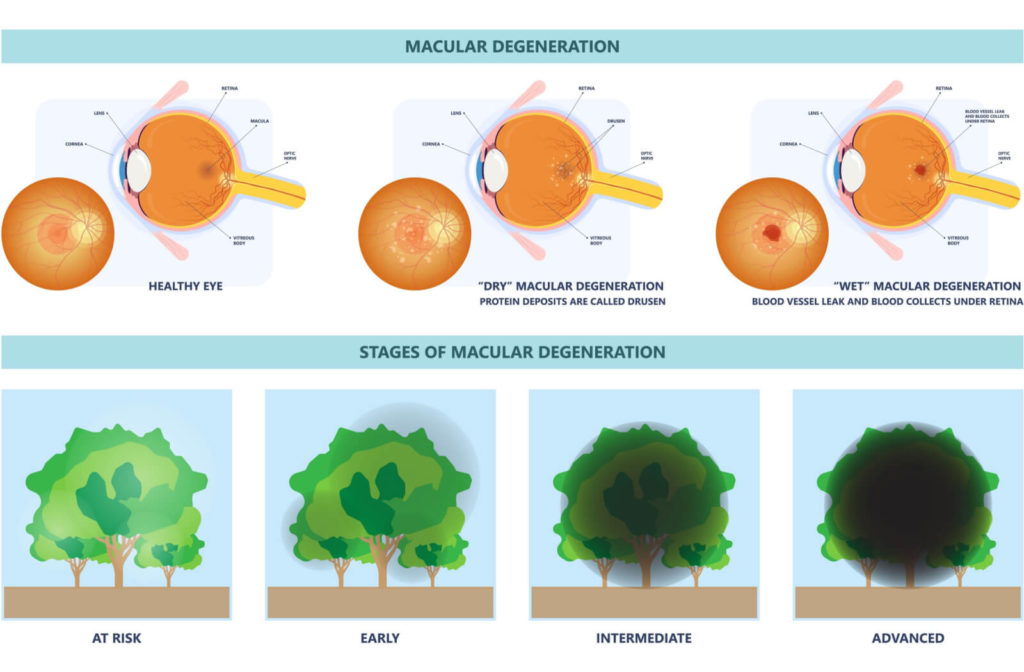Macular degeneration, also known as age-related macular degeneration (AMD), is a common eye condition affecting the retina’s central portion, known as the macula. It’s the leading cause of vision loss in people over 50, and it can significantly impact a person’s quality of life.
It can be detected during an eye exam, and there are even advanced diagnostic tools, such as retinal photography, that can allow optometrists to observe this progressive condition better.
One question many people have about macular degeneration is whether or not it is hereditary. While genetics play a key role in diagnosing macular degeneration, it’s not the only factor. However, regular eye exams can assist with early detection if you have a family history of AMD.
What Is the Macula?
You may already know how an eye creates images, but let’s go over it one more time. Knowing how a healthy eye works is vital in understanding what happens when things go wrong.
When light enters the eye, it’s focused through your cornea (the clear dome at the front of your eye) and lens, coming together at the back of the eye. The back of your eye is called the retina and right at the very centre is a small, sensitive area responsible for central vision. This area is the macula.
The macula is necessary for tasks such as reading, driving, and recognizing faces. When the macula is damaged, it can cause a range of vision problems, including:
- Blurred vision
- Distorted vision, such as straight lines appearing to bend
- Difficulty seeing in low light
- Trouble recognizing faces
- A blurry or blind spot in your field of vision
These symptoms generally develop gradually. There are two types of macular degeneration: dry and wet.
Dry AMD
Dry macular degeneration may also be called atrophic AMD. This type is the most common form of macular degeneration. 80% of people who have AMD have the dry form. This type occurs when the macular gets thinner as we age, progressing in 3 stages from early, intermediate, to late stage. Unfortunately, there is, as of yet, no treatment for dry AMD.
Wet AMD
While wet AMD is less common, it can lead to faster vision loss. Also known as advanced neovascular AMD, this form of macular degeneration occurs when abnormal blood vessels grow into the back of the eye. Treatment options are available for wet AMD when it is detected early.

What Causes Macular Degeneration?
If you have a family member with macular degeneration, you may wonder if it is hereditary. The short answer is that genetics can play a role in the development of the condition, but they are not the only factor.
Studies have shown that certain genetic variations can increase a person’s risk of developing macular degeneration, but these variations do not guarantee that a person will develop the condition, so you can let your parents off the hook.
In addition to genetics, other risk factors for macular degeneration can include:
- Age
- Smoking
- Race
- Obesity
- Cardiovascular disease
The condition is not necessarily inherited from one’s parents. This is good news, as it means that you can take steps to reduce your risk of developing the condition. These steps include getting regular eye exams, not smoking, and maintaining a healthy diet and blood pressure.
How Eye Exams Can Detect Macular Degeneration
Eye exams are an essential part of detecting and managing macular degeneration. Again, early detection is critical, as the earlier AMD is detected, the more treatment options are available.
During an eye exam, the eye doctor can assess your vision and check for any signs of macular degeneration. This exam may include testing your visual acuity, performing a dilated eye exam, and using specialized imaging techniques to examine the retina.
If macular degeneration is detected, your eye doctor will work with you to develop a treatment plan tailored to your specific needs.
For dry AMD, treatment might involve dietary supplements to help slow its progression. Treatment for wet AMD could involve injectable medicines or laser treatment to block off abnormal blood vessels. Since dry AMD can become wet AMD, it’s vital to see your optometrist regularly, as wet AMD can cause vision loss.
It’s worth noting that while researchers are developing treatments, we cannot cure macular degeneration yet. However, there are several assistive technologies and low-vision aids that can help people with the condition maintain their independence and quality of life. These may include magnifiers, special glasses, and electronic devices to help read and navigate unfamiliar environments.
Taking Care of Your Vision
Macular degeneration is a complex condition that can significantly impact a person’s vision. While genetics may play a role in its development, other factors may also contribute.
Simply because macular degeneration is common doesn’t mean it’s harmless. Using innovative imaging technology, Queensway Optometric Centre can help detect signs of macular degeneration. If you notice changes in your central vision or lose the ability to see fine detail, contact us as soon as possible. Your clear vision will thank you.


